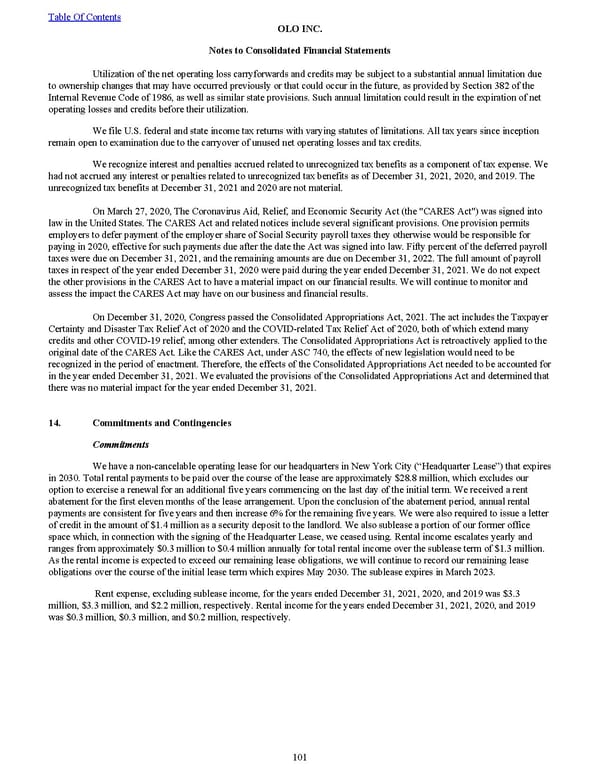Utilization of the net operating loss carryforwards and credits may be subject to a substantial annual limitation due to ownership changes that may have occurred previously or that could occur in the future, as provided by Section 382 of the Internal Revenue Code of 1986, as well as similar state provisions. Such annual limitation could result in the expiration of net operating losses and credits before their utilization. We file U.S. federal and state income tax returns with varying statutes of limitations. All tax years since inception remain open to examination due to the carryover of unused net operating losses and tax credits. We recognize interest and penalties accrued related to unrecognized tax benefits as a component of tax expense. We had no t accrued any interest or penalties related to unrecognized tax benefits as of December 31, 2021 , 2020 , and 2019 . The unrecognized tax benefits at December 31, 2021 and 2020 are not material. On March 27, 2020, The Coronavirus Aid, Relief, and Economic Security Act (the "CARES Act") was signed into law in the United States. The CARES Act and related notices include several significant provisions. One provision permits employers to defer payment of the employer share of Social Security payroll taxes they otherwise would be responsible for paying in 2020 , effective for such payments due after the date the Act was signed into law. Fifty percent of the deferred payroll taxes were due on December 31, 2021 , and the remaining amounts are due on December 31, 2022 . The full amount of payroll taxes in respect of the year ended December 31, 2020 were paid during the year ended December 31, 2021 . We do not expect the other provisions in the CARES Act to have a material impact on our financial results. We will continue to monitor and assess the impact the CARES Act may have on our business and financial results. On December 31, 2020 , Congress passed the Consolidated Appropriations Act, 2021. The act includes the Taxpayer Certainty and Disaster Tax Relief Act of 2020 and the COVID-related Tax Relief Act of 2020, both of which extend many credits and other COVID-19 relief, among other extenders. The Consolidated Appropriations Act is retroactively applied to the original date of the CARES Act. Like the CARES Act, under ASC 740, the effects of new legislation would need to be recognized in the period of enactment. Therefore, the effects of the Consolidated Appropriations Act needed to be accounted for in the year ended December 31, 2021 . We evaluated the provisions of the Consolidated Appropriations Act and determined that there was no material impact for the year ended December 31, 2021 . 14. Commitments and Contingencies Commitments We have a non-cancelable operating lease for our headquarters in New York City (“Headquarter Lease”) that expires in 2030. Total rental payments to be paid over the course of the lease are approximately $28.8 million , which excludes our option to exercise a renewal for an additional five years commencing on the last day of the initial term. We received a rent abatement for the first eleven months of the lease arrangement. Upon the conclusion of the abatement period, annual rental payments are consistent for five years and then increase 6% for the remaining five years . We were also required to issue a letter of credit in the amount of $1.4 million as a security deposit to the landlord. We also sublease a portion of our former office space which, in connection with the signing of the Headquarter Lease, we ceased using. Rental income escalates yearly and ranges from approximately $0.3 million to $0.4 million annually for total rental income over the sublease term of $1.3 million . As the rental income is expected to exceed our remaining lease obligations, we will continue to record our remaining lease obligations over the course of the initial lease term which expires May 2030 . The sublease expires in March 2023. Rent expense, excluding sublease income, for the years ended December 31, 2021 , 2020 , and 2019 was $3.3 million , $3.3 million , and $2.2 million , respectively. R ental income for the years ended December 31, 2021 , 2020 , and 2019 was $0.3 million , $0.3 million , and $0.2 million , respectively. Table Of Contents OLO INC. Notes to Consolidated Financial Statements 101
 2022 10K Page 107 Page 109
2022 10K Page 107 Page 109